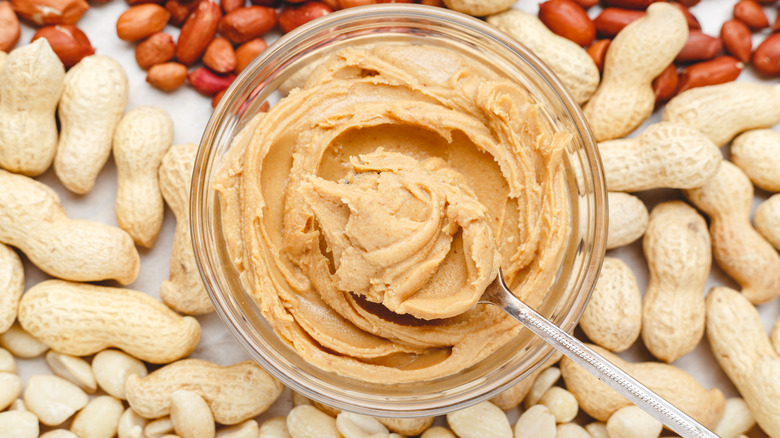Is It Possible To Eat Too Much Peanut Butter?
Peanut butter: It's the all-American staple of children's lunchboxes, the star ingredient of Forbes' best-selling Halloween candy in the country, and even a featured flavor in certain whiskeys, but can we have too much of a good thing? Absolutely, if you are part of the 1.1% of Americans who the National Center for Biotechnology Information estimates suffer from peanut or tree nut allergies. But even for the rest of us who don't need to worry about potentially fatal reactions, eating too much peanut butter can have some less-than-pleasant side effects.
While peanut butter is undeniably a versatile ingredient and a good source of protein, which, according to Medical News Today, contains beneficially high amounts of magnesium, zinc, and vitamin B-6, it is also high in fats, calories, and sodium. Although these are perfectly healthy when consumed in moderation, Eat This, Not That notes that eating more than two tablespoons (28 grams) of the spread per day can lead to unwanted weight gain or conditions like high blood pressure and high cholesterol.
Chef Serena Poon explained to Eat This, Not That, that peanut butter is high in Omega-3 and Omega-6 fatty acids, which are necessary antioxidants; however, they are contained in highly disproportionate amounts, with roughly 180 times more Omega-6 than Omega-3, when they should be balanced one-to-one. Poon explained that this imbalance, if maintained regularly, can lead to inflamed and clogged arteries, which can lead to severe cardiovascular problems, including heart attacks or strokes.
This spread is best in moderation
This isn't to say you should eliminate your favorite lunchtime snack, but perhaps you should differentiate your diet more. If you're heavy-handed on your PB&Js, maybe alternate eating them with something lower in fat. In fact, dietician Lauren Minchen recommends not eating anything every day, noting the benefits of having a varied diet (via Yahoo! News).
Another reason to switch things up? So you can keep eating your favorite foods over time! While not as severe as peanut allergies, many people develop an intolerance to peanuts and peanut butter by eating them in too high a quantity over an extended period of time, according to Minchen, which can lead to allergy-like symptoms of rashes, nausea, fatigue, or acne. While these intolerances can be reversed by removing the offending food from your diet temporarily, why put yourself through that when you could just mix things up?
Like so many other foods, peanut butter is best when enjoyed in moderation. Even avoiding more extreme side effects, Eat This, Not That notes that over-indulging even once in a while can lead to short-term discomforts like stomach aches, heartburn, and indigestion, as many kids learn on Halloween night after eating too many peanut butter cups and candy bars.
Finally, the best way to reap the nutritional benefits of peanut butter without taking on extra risks is to enjoy brands that are more natural or organic, such as varieties from Richard's or Trader Joe's, per Healthline. Why not try a hearty peanut butter soup for a healthy option, too?

